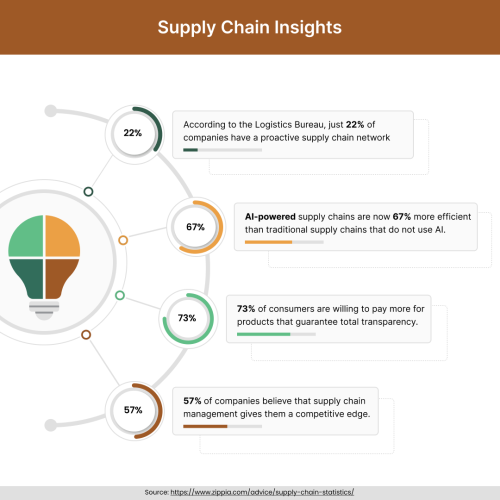Growing demand of ESG regulations and the need for compliance:
Navigating the complex landscape of global regulations governing sustainable supply chains is a daunting task for businesses, yet it is a strategic necessity in today’s interconnected world. The growing demands of investors and consumers foster the need for meticulous compliance tracking and reporting of supply chain activities, ensuring transparency and accountability. Tracking diverse standards in global supply chains presents challenges due to varied stakeholder demands, changing regulations, and differing quality definitions.
Businesses must implement solutions to monitor every aspect of their supply chains, from raw materials to finished products. This not only helps in adhering to environmental, social, and governance (ESG) criteria but also mitigates risks associated with non-compliance. Leveraging advanced technologies such as AI, traceability can ease data management and provide insights that support strategic decision-making. By prioritising compliance through effective traceability, companies can build trust with stakeholders, improve operational efficiency, and gain a competitive edge in the market.
Traceability as a solution to transparency:
Traceability provides a viable solution for maintaining compliance by offering a transparent view of the supply chain, while promoting overall sustainability. It encourages responsible sourcing and ethical practices by allowing businesses to monitor and verify the origins and handling of their materials and products. This transparency is crucial for meeting the growing demands of investors and consumers who prioritise environmental and social governance (ESG) criteria. Additionally, traceability helps companies to gauge ESG risks and reduce their carbon footprints by identifying inefficiencies and areas for improvement. It also ensures ethical labour practices by making it easier to audit and enforce labour standards across the supply chain. By prioritising traceability, businesses can build trust with stakeholders, mitigate risks associated with non-compliance and gain a competitive edge in the market.
RightOrigins Platform and its advantages:
RightOrigins is our AI-powered Supply chain Traceability and ESG Intelligence suite that helps in ESG data management, supply chain visibility and compliance tracking. By aggregating data into the RightOrigins traceability platform, businesses can greatly increase efficiency and gain deeper analysis and insights to strengthen compliance management.
With more global reporting frameworks and looming deadlines, firms are under pressure to integrate ESG into their strategies, comply with standards, and show progress towards their goals. To support organisations unsure of where to start their ESG journey, we offer four modules tailored for every stage of the ESG journey. Our AI-powered platform assists with Data consolidation, Tier 1 Supplier Mapping, Multi-tier Supply Chain Mapping, and Advanced batch-level traceability. By streamlining compliance and product data, our software helps companies implement an enterprise-wide ESG strategy, demonstrate compliance with ESG regulations, and ensure transparent data by aligning regulatory requirements with ESG goals. Here are the four modules:
- RightData: Managing ESG data in spreadsheets is becoming untenable, leading to risks of data loss, unverifiable information, and potential regulatory penalties. This module helps in consolidating compliance and product data from various systems. It automates responses to queries from buyers, auditors and other stakeholders, creating a comprehensive digital profile that facilitates easy data retrieval and sharing.
- RightSupplier: This module maps and evaluates tier 1 suppliers, leveraging collected data to proactively mitigate risks, enhancing supply chain transparency and decision-making.
- RightChain: It simplifies multi-tier supplier data collection, organising and analysing data to mitigate risks effectively. This module ensures compliance and fosters efficient supplier collaboration, reducing manual efforts and enhancing supply chain integrity.
- RightTrace: This module offers batch-level traceability, documenting key data points across the product journey. It enhances compliance, quality control, and authenticity, providing a comprehensive view of product life cycles.
Streamlining data for compliance:

Given the above market opportunity, supply chain visibility is crucial to compliance management. RightOrigins transforms supply chain management and compliance practices by organising and streamlining data, making it easier to monitor and manage each step in the supply chain. This organised approach not only reduces the risk of non-compliance but also provides comprehensive data insights and analytical reports.
Conclusion:
By leveraging RightOrigins, companies can build more resilient, transparent, and sustainable supply chains, ultimately gaining a competitive edge in the market while meeting the increasing demands for responsible business practices. Amid stringent environmental regulations and heightened sustainability expectations, adopting traceability is a strategic move for businesses. It’s an investment in compliance, transparency, and long-term sustainability, essential for future success. Compliance is not merely an option but a business imperative.
